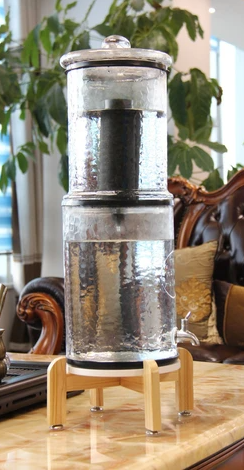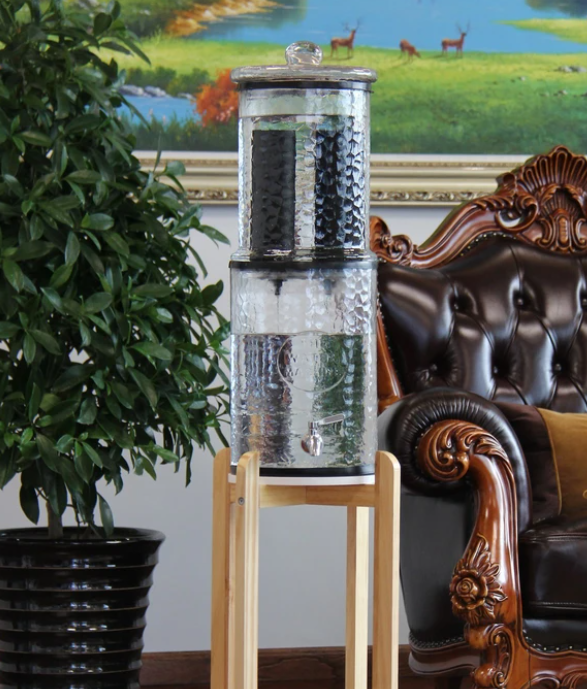What is the best way to purify water at home? With a water purification system! And we’ve found an absolutely amazing home water purification system. The Water Machine makes the purest, zero-taste, and most refreshing water you’ll ever experience in your life. But why do we need to purify our home water? And what’s the difference between home water filtration systems and home water purification systems? Let’s explore these questions.
What’s In Drinking Water?
Do you know what’s in your drinking water? What’s in your drinking water can vary widely, depending on your water source and your location. Generally speaking, we get our water from one or more of 3 places: public water systems (like from those tall water towers we see from time to time), private water systems (like wells), and commercially bottled water.
Public Water Systems
There are over 155,000 public water systems in the US, serving over 286 million people. The EPA (Environmental Protection Agency) regulates drinking water, and tests regularly to ensure that water systems meet their standards. The water comes from either surface water sources or ground water sources. Either source can contain any number of germs, parasites, bacteria, and viruses. Water treatment plants disinfect water to remove these disease-causing contaminates using Chlorine or Chloramine.
Both are effective disinfectants, but also leave their own mark (and taste) on your drinking water. Chlorine can produce ‘disinfection by-products,’ which are chemicals that are produced by chlorinated water while it’s in your pipes. And Chloramine can change the chemical properties of water, which can affect copper and lead pipes, thereby adding copper or lead to your drinking water. Both metals can be toxic to humans and pets, even in small quantities. The EPA provides guidelines on how to minimize lead and copper levels in drinking water.
Also, public water systems routinely add fluoride to tap water. While fluoride is good for your teeth, consuming it isn’t so great for your body. The EPA regulates how much of these disinfectants, fluoride, other chemicals, and by-products (chemicals) can remain in the water you consume. Also both disinfectants are highly toxic to fish, reptiles, amphibians, and other aquatic animals. So any water used for these animals must be purified of these chemicals.
Private Water Systems
Private Water Systems includes wells (ground water) and rainwater collection. EPA regulations do not apply to privately owned water systems, so owners are individually responsible for ensuring their drinking water is safe from contaminates. The top twelve contaminates causing outbreaks in Private Water Systems in the US are: Hepatitis A, Giardia, Campylobacter, Shigella, E.coli, Cryptosporidium, Salmonella, Arsenic, Gasoline, Nitrate, Phenol, Selenium, and Yersinia enterocolitica. (Source: CDC: Private Water Systems | Private Water Systems | Drinking Water | Healthy Water | CDC)
Bottled Water
In the US, the FDA (Food and Drug Administration) regulates bottled water safety. The FDA uses the EPA standards for tap water as a basis for their regulations. And, the FDA has additional regulations regarding the processing practices and bottling of drinking water sold to consumers.
Bottled water can come from any number of sources, including tap water from public water systems. Unfortunately, there are no standardized labeling rules for bottled water, so your favorite bottled water may or may not disclose to you how, and with which chemicals, their water is treated. You may have to call the company or check their website to get the info you need to know about their water treatment processes.

What Is In Pure Water?
Well, strictly speaking, pure water would contain nothing other than water. But since there is no natural source of pure water, purified water is the next best thing. Purified water is water that has been processed or filtered to remove impurities. Some of the ways to purify water include distilling, capacitive deionization, reverse osmosis, carbon filtering, microfiltration, ultrafiltration, ultraviolet oxidation, electrodeionization or a combination of these.
Purified Water vs. Filtered Water
So, what is the difference between Filtered Water and Purified Water? This one is fairly simple to explain. While all purified water has been filtered, not all filtered water is purified. See, the filtration process filters out many, but not all contaminates. Many bottled water brands tout their 99% filtration, which is a higher filtration than public water source tap water, but not nearly as pure as purified water. Still, this level of filtration means that out of every 1 BILLION bacteria particles, 10 MILLION remain after filtration.
In-home water filtration systems boast up to 99.99% filtration of pathogenic bacteria. That means that out of every 1 million bacteria initially present in the water, the filter will filter out all but 100 of those bacteria. (So out of every 1 BILLION, 100,000 bacteria particles remain.) And while that’s a significant improvement over tap water and most bottled water, those systems still underperform home water purification systems. Also filtering water does little to eliminate viruses, Chlorine, Chloramines, and Fluoride.
The Water Machine removes 99.9999999% of pathogenic bacteria. That means that out of every 1 BILLION bacteria, only ONE remains after the purification process. That’s ONE HUNDRED THOUSAND TIMES BETTER than water filtration systems. And while the difference between 99.99 and 99.9999999 may not seem significant in the context of many other things, when it comes to water safety, every decimal place means a significant reduction in the possibility of ingesting toxins. So….
What is The Best Home Water Filtration System? A Home Water Purification System!
And with The Water Machine, all the beneficial minerals your body needs are still there! Best of all the cost is only about 2 cents per gallon, which is far more economical than bottled water that’s not as purified!
Additionally, The Water Machine is Eco-Friendly. It’s made of hammered glass, instead of plastic or metal, so there’s no unwelcome plastic or metallic ‘flavor’ added to your water. And there’s no plastic waste to contribute to landfills. You’ll simply get the purest and most refreshing water you’ll ever experience.
This is a gravity system, so there are no electronic parts to break. Just add your water to the upper chamber and gravity sends it through the two cutting-edge purification elements and into the lower chamber, which has a 3-gallon capacity. The gravity purification elements are replaceable and can filter up to 6,000 gallons of water before they need to be replaced. That’s about once every 10 years if you consume 1.5 gallons per day. So, to answer the question…
What Is Best Way to Purify Water at Home? The Water Machine! The World’s First Gravity and Glass Water Purification System.
It Removes:

- 99.9999999% of pathogenic bacteria. PLUS:
- 99.999% of viruses
- Chlorine
- Chloramines
- Fluoride
- Parasites
- Petroleum contaminants
- Heavy Metals (Lead, Copper, etc.)
- Pharmaceuticals
- Trihalomethane (THMs)
- Bisphenol-A (BPA)
- Perfluorochemicals (PFOAs)
- Radiologicals
- Herbicides & Pesticides
It’s low-maintenance, costs about 2 cents per gallon, and is Eco-Friendly. And it’s so easy to set up, you’ll be ready to fill it in about 5 minutes. It can sit on your countertop, or you can display it in its own attractive floor stand.
And if all that weren’t enough, a portion of all sales go to non-profit organizations that help others get clean water, such as Water.org and charitywater.org.
What Is Best Way to Purify Water? You know the answer by now.
And, while I wouldn’t suggest trying to turn water into wine, you can always have a glass of fine wine available to you when you join our Wine of the Month club.


